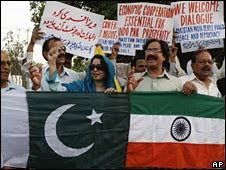Are India and Pakistan back to square one as far as peace talks are concerned? Has the dialogue between South Asia's warring neighbours - which appeared to be limping back to some normalcy in the past six months - collapsed?
Triggering off this frenzied debate in India has been Pakistan Foreign Minister Shah Mehmood Qureshi's surprising outburst on Friday blaming India for the talks deadlock: "It seems India is not mentally prepared to engage in a dialogue," he said.
Mr Qureshi's feelings appear to have been provoked by familiar frustrations that have traditionally bedevilled ties between the two sides. Only this time, Pakistan appears to be complaining about India's inflexibility - meaning, among other things, a refusal to discuss thornier issues like Kashmir - impeding a fair dialogue. This is nothing new. India has always held Pakistan is obsessed with Kashmir; Pakistan says India cannot see beyond alleged Pakistani involvement in the 2008 Mumbai attacks.
What prompted Mr Qureshi's sudden broadside against India even as his Indian counterpart was getting ready to board the flight to Delhi? Many in Delhi say that the Pakistani establishment was seething after India's Home Secretary, GK Pillai, accused the Pakistani spy agency Inter-Services Intelligence of being involved in the Mumbai attacks on the eve of the talks. Some are already wondering whether the comments were deliberately aimed to derail the talks - Delhi's foreign policy pundits talks about hawks and doves in the government who are divided over the need for talks with Pakistan. On the other hand, most Indians believe that the Pakistani leadership is not doing enough to rein in militants launching attacks on India, and clerics indulging in hate campaigns against India.
What left most baffled was Mr Qureshi's personal attack on Mr Krishna, that he kept interrupting their meeting by taking calls from Delhi - something which many in India find a breach of diplomatic etiquette. Mr Krishna has denied the allegation.
But then nobody expected any dramatic breakthroughs in the Islamabad talks. The Indian media echoed the sentiment in their coverage today. One bland headline simply said: "India, Pakistan decide to remain engaged." That is how low expectations are in India about ties with its estranged sibling these days.
But browsing the Pakistani media, I came away with the impression that the frustration was higher on the other side of the border. The News, a Pakistan daily, lamented that the talks had "collapsed, not for the sheer absence of the right momentum, but because of India's inflexibility."
Clearly, Mr Qureshi's outburst will make it difficult for India to sell the talks to its people - a leader of the main opposition BJP, a Hindu nationalist party, has already demanded that talks be called off. But the two sides need to keep talking. Because when it comes to two nuclear-armed hostile neighbours, not talking can be more perilous for both. Pakistan's frustration with a stalemate should not surprise many. "Stalemate [between India and Pakistan] seems to be more attractive to each side that finding a solution," says Stephen Cohen, a regional specialist at the Brookings Institution, a US foreign policy think tank. The problem is that this prolonged, agonising stalemate hurts the people of both the countries, and ensures the region's future remains in jeopardy.


No comments:
Post a Comment